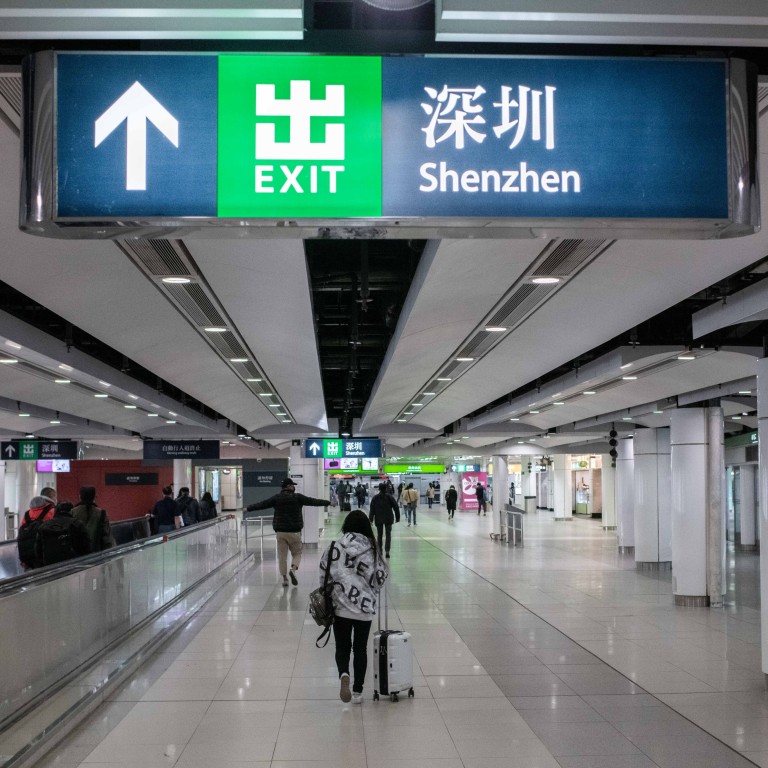
Polling stations to be set up at 3 border checkpoints for Hong Kong residents in mainland China to vote in Legislative Council election
- The polling stations at Heung Yuen Wai, Lo Wu and the Lok Ma Chau Spur Line will serve a maximum of 33,000, 42,000 and 36,000 voters, respectively
- The arrangement will allow Hongkongers living on the mainland to cast ballots without having to undergo quarantine
The government on Monday confirmed that polling stations would be set up at the Heung Yuen Wai, Lo Wu, and Lok Ma Chau Spur Line control points, each of which will serve a maximum of 33,000, 42,000 and 36,000 voters, respectively.
Voters will need to specify beforehand which checkpoint they plan to use and when, and register online accordingly between 9am this Wednesday and 6pm next Wednesday.
Those who sign up will need to provide their Hong Kong ID, home return permit and contact phone numbers, as well as their email address and the city they live in. A full residential address is not required.
Vague ‘platforms’ in Legco functional constituency races raise eyebrows
The one-off arrangement will only apply to those who have registered to vote in the geographic and functional constituencies, as the 1,448 members of the Election Committee are required to cast ballots for their legislative representatives at a designated polling station in the Hong Kong Convention and Exhibition Centre in Wan Chai.
To comply with local election laws, which stipulate that ballots be cast within the city, those taking advantage of the border polling stations will need to briefly cross into Hong Kong to vote.
The two land checkpoints currently being used for limited cross-border travel, at Shenzhen Bay and the Hong Kong-Zhuhai-Macau Bridge, will not be part of the voting scheme, to avoid them being overwhelmed by an influx of people.
Voters must also receive a negative Covid-19 test result no more than 48 hours before entering Hong Kong on election day.
Meet the Hong Kong election candidate no one had heard of – until last week
Secretary for Constitutional and Mainland Affairs Erick Tsang Kwok-wai said the three checkpoints had been chosen because they were more spacious and easily accessible by public transport from the Shenzhen side.
“The government attaches much importance to the election, and is committed to ensuring that it will be conducted in a fair, just and honest manner, while being safe, efficient and providing more convenience for the public,” he said, noting that many Hongkongers were stranded across the border because of travel restrictions.
“We understand that many of them would like to be able to cast their votes in the coming election so that their voices can be represented in the legislature.”
Tsang, however, declined to speculate on the response to the scheme, stressing it was “not for boosting the turnout rate; it is to facilitate electors voting”.
He also noted that the scheme was open to all eligible Hongkongers on the mainland, not just those in Guangdong, and that the local government’s representative offices across the border would help promote the election and the new arrangements.

Addressing the legality of the new scheme, Tsang argued that those living on the mainland could still be regarded as “ordinarily residing in Hong Kong”, as required by the city’s election laws, but added it was too early to say whether the government would adopt similar measures for future polls.
However, elections expert Ma Ngok, a political scientist at Chinese University, cast doubt on how fairness could be ensured under the new arrangements.
“How can candidates reach out to the voters across the border? How can the government check if the election activities are properly conducted if they are done outside Hong Kong?” he said.
“What’s more, unlike other vote-counting stations elsewhere in the city, members of the public cannot go to the stations at the control points to observe the count. This could weaken the public’s confidence in the election.”
Tsang said candidates and their representatives would be invited to observe the vote count at the three border stations, but argued there was a need to avoid large crowds there to lower the risk of a Covid-19 outbreak.
Only 3 Hong Kong Legco candidates identify as ‘pro democracy’
The December 19 election will be the first legislative poll since Beijing overhauled the city’s political system to ensure only “patriots” held power.
Thirty seats will be returned by trade-based functional constituencies, while 40 will be selected by the Election Committee, dominated by pro-Beijing figures. All other Legco candidates are also required to secure nominations from the newly empowered committee before running.
Hong Kong has about 4.47 million registered voters, accounting for about 60 per cent of the population. According to national census data released in May, about 370,000 Hong Kong residents aged 18 or above live on the mainland.
The pro-establishment camp has long lobbied for polling stations to be set up on the mainland to allow those voters to more easily cast ballots, but the idea could never overcome logistical and legal hurdles.

